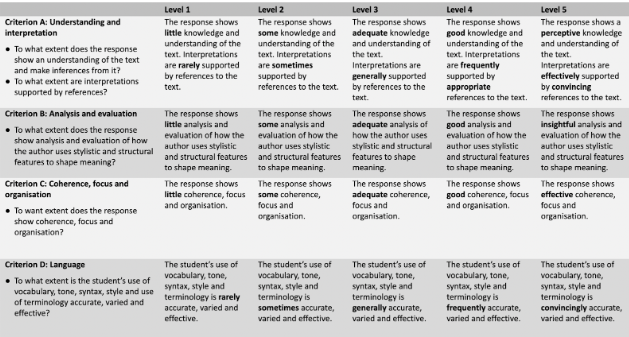Ultimate Guide To IB English
What’s Covered:
- IB HL vs SL: What’s the Difference?
- How Do SL Papers/Exams Work?
- How are the IB English SL Papers/Exams Scored?
- Final Tips
The International Baccalaureate Diploma Programme or IBDP for short, is a high school curriculum taken by students all over the world. Its prestige lies in the rigor and academic difficulty of the courses taught within the program, leading to its acceptance worldwide in hundreds of universities and colleges.
Within the numerous courses offered, IB has English SL, one of the most taken and popular courses. The following blog post is going to be about how to best tackle the exams in this class and hopefully provide you with some tips to be more prepared for exam day!
IB HL vs SL: What’s the Difference?
IB separates its courses into two kinds of difficulties, higher level (HL) and standard level (SL). The largest difference between these two courses can be mostly attributed to the amount of coursework expected to be understood by the student, and how much knowledge is required to be applied into practice.
In the case of this course, Language A is separated by the number of text and forms of literature required to be read/analyzed in the course, more on this later.
While SL is definitely easier than HL, English can be a little different given that the literature being analyzed will be difficult or easy based. This blog is going to be about how you can excel in English
How Do SL Papers/Exams Work?
SL papers for the Literature exam are divided into two components:
- Paper 1 is a 1 hour and 15 minute long essay-based examination that requires you to analyze unseen texts.
- Paper 2 is a 1 hour and 15 minute long examination that will require you to answer questions based on the required texts for the course.
Paper 1
Paper 1 as mentioned earlier, is not going to be based on the required forms of literature you’ve read during the course of your curriculum. It will be based on unseen poems and snippets of usual books, or perhaps (although unlikely) a digital medium such as a blog or website. Therefore, this exam tests the student’s ability to analyze a text on the spot, and their speed in doing so.
Based on the type of student you are, you might find Paper 1 difficult if you aren’t as easily prepared to analyze text. Paper 1 requires you to break down excerpts into digestible chunks of information, to answer questions like “What are the most prevalent themes in this poem”. A question like this is decently broad, giving you some space in how you can choose to answer this problem.
The best way to go about such questions is by coming into the exam with a sort of “blueprint” that you can apply as a general starter/direction in the way you solve questions. This blueprint can be as simple as starting the exam by skimming for keywords/repeated phrases to help determine a common theme/motive in the text, which would help answer questions later on regarding these things.
In general, paper 1 can be considered a bit more lenient in how it will be graded, in respect to the lack of preparation and material the student can come into the exam with. It’s in the exam’s nature for this paper to be inquisitive and to provoke creative thinking in the student, so keep that in mind when attempting this paper!
Paper 2
Paper 2 is generally the paper students find a slightly easier time with, as they are able to pick prompts/questions from the options provided. These prompts are based on texts and required readings that have been assigned from a board at IBO, who then send these selections out to schools all over the world. The way these papers are designed, no matter which text you chose to focus on in class during the curriculum, there will be at least one question directly pertaining to it. There will sometimes also be more general questions that can be used to answer in respect to numerous texts.
The prompts in this paper are created with the expectations for students to create well-structured and formatted essay responses. The answers cannot be remotely as open-ended as something in paper 1, as there is ample amount of time for preparing ideas and responses that can apply to a prompt no matter which text you choose to study.
The best way to prepare for paper 2 would be to thoroughly understand your reading material, as fully possible as you can. You have a little under two years to do this, which is more than enough time to not only read the material, but to also take notes, highlight and realize which areas are of key importance to how the text changes over time and what its author’s intentions were in creating it. This paper is best described as an examination of how well you understood your material.
How are the IB English SL Papers/Exams Scored?
Both papers are scored out of 20 points, and are based off a rubric/criterion chart that can be used to pick a score based on performance.
The criteria can be clearly seen in the diagram above, with level 1 being the weakest performance in each criteria, up to 5 being the strongest.
Studying the criteria can also help you understand what a grader is looking for when reading your paper, which can only make it easier for you to score well. The points given to you based on criteria performance changes every year, so check in for the latest data from IB, which is usually handed out in school from your teachers!
The scores out of 20 are then used along with your performance in internal assessments to determine a grade out of 7 for the class. The table below, called a grade boundary table, is used by graders to determine this score out of 7.
To calculate your grade, you would take the total score on both papers (which is out of 40) and your internal assessment grades, a total isn’t as clear here as it’s based on what your teachers would decide. Divide your earned points by the total number of available points, and multiply the decimal by a 100 to get a percentage. This number can tell you where you are from 1 to 7, based on the table above.
Final Tips
Exam Day Stress
Stress on the day of the exam is possibly the biggest factor to why students don’t meet their expectations in performance, even though they feel adequately prepared. This is usually caused by feelings of anxiety and pressure, but it doesn’t have to be this way! The great thing about IB exams is that they can be taken again numerous times! In fact, many students do! If you feel like this examination is the most important moment of your life as a student, then you’re wrong.You can always try again if you aren’t ready or if you feel as though you could do better. Understanding this fact can help you feel relieved and like a weight has fallen off your shoulders!
Read Numerous Texts
The best thing about paper 2 is that you already know what you’re going to be tested on before even walking into the exam room! The examination is going to be based on prompts pertaining to the reading material options you’ve been provided when you started IB English. However, you still won’t know what the exact questions on the exam might be, therefore it might be beneficial for you to read at least two required texts. By reading an extra one (or more), you can have a better pick of questions during the exam, instead of struggling to only solve one because that’s the only material you had read.
How Does the IB English HL Exam Affect My College Chances?
In short, it doesn’t! The exam scores don’t mean much in the way of your college admissions, but showing determination in sticking with a difficult class, such as English Literature SL, shows much more! Colleges are excited to see students with the capability and determination to take such challenging classes, and to excel in them is even better! There are numerous factors that are considered for college admissions, and some matter more than others.
It can be really difficult to keep track of your college admissions chances, but using CollegeVine’s admissions calculator makes this so much easier! This intuitive tool takes inputs ranging from your GPA, standardized test scores, extracurriculars and numerous other factors to determine your unique calculations/chances of getting into a certain college/university!





